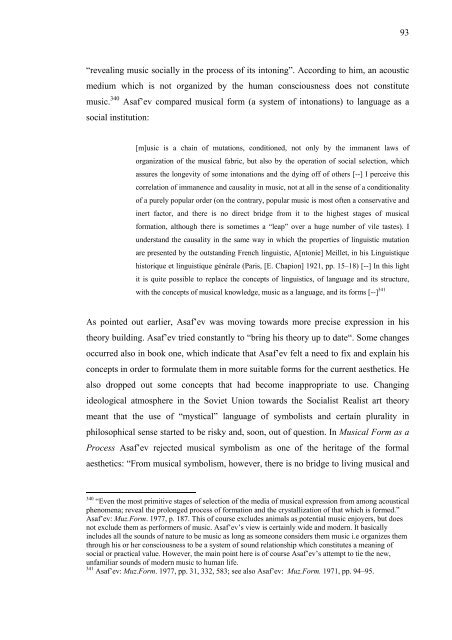Boris Asaf'ev and the Soviet Musicology - E-thesis
Boris Asaf'ev and the Soviet Musicology - E-thesis
Boris Asaf'ev and the Soviet Musicology - E-thesis
Create successful ePaper yourself
Turn your PDF publications into a flip-book with our unique Google optimized e-Paper software.
“revealing music socially in <strong>the</strong> process of its intoning”. According to him, an acoustic<br />
medium which is not organized by <strong>the</strong> human consciousness does not constitute<br />
music. 340 Asaf’ev compared musical form (a system of intonations) to language as a<br />
social institution:<br />
[m]usic is a chain of mutations, conditioned, not only by <strong>the</strong> immanent laws of<br />
organization of <strong>the</strong> musical fabric, but also by <strong>the</strong> operation of social selection, which<br />
assures <strong>the</strong> longevity of some intonations <strong>and</strong> <strong>the</strong> dying off of o<strong>the</strong>rs [--] I perceive this<br />
correlation of immanence <strong>and</strong> causality in music, not at all in <strong>the</strong> sense of a conditionality<br />
of a purely popular order (on <strong>the</strong> contrary, popular music is most often a conservative <strong>and</strong><br />
inert factor, <strong>and</strong> <strong>the</strong>re is no direct bridge from it to <strong>the</strong> highest stages of musical<br />
formation, although <strong>the</strong>re is sometimes a “leap” over a huge number of vile tastes). I<br />
underst<strong>and</strong> <strong>the</strong> causality in <strong>the</strong> same way in which <strong>the</strong> properties of linguistic mutation<br />
are presented by <strong>the</strong> outst<strong>and</strong>ing French linguistic, A[ntonie] Meillet, in his Linguistique<br />
historique et linguistique générale (Paris, [E. Chapion] 1921, pp. 15–18) [--] In this light<br />
it is quite possible to replace <strong>the</strong> concepts of linguistics, of language <strong>and</strong> its structure,<br />
with <strong>the</strong> concepts of musical knowledge, music as a language, <strong>and</strong> its forms [--] 341<br />
As pointed out earlier, Asaf’ev was moving towards more precise expression in his<br />
<strong>the</strong>ory building. Asaf’ev tried constantly to “bring his <strong>the</strong>ory up to date“. Some changes<br />
occurred also in book one, which indicate that Asaf’ev felt a need to fix <strong>and</strong> explain his<br />
concepts in order to formulate <strong>the</strong>m in more suitable forms for <strong>the</strong> current aes<strong>the</strong>tics. He<br />
also dropped out some concepts that had become inappropriate to use. Changing<br />
ideological atmosphere in <strong>the</strong> <strong>Soviet</strong> Union towards <strong>the</strong> Socialist Realist art <strong>the</strong>ory<br />
meant that <strong>the</strong> use of “mystical” language of symbolists <strong>and</strong> certain plurality in<br />
philosophical sense started to be risky <strong>and</strong>, soon, out of question. In Musical Form as a<br />
Process Asaf’ev rejected musical symbolism as one of <strong>the</strong> heritage of <strong>the</strong> formal<br />
aes<strong>the</strong>tics: “From musical symbolism, however, <strong>the</strong>re is no bridge to living musical <strong>and</strong><br />
340 “Even <strong>the</strong> most primitive stages of selection of <strong>the</strong> media of musical expression from among acoustical<br />
phenomena; reveal <strong>the</strong> prolonged process of formation <strong>and</strong> <strong>the</strong> crystallization of that which is formed.”<br />
Asaf’ev: Muz.Form. 1977, p. 187. This of course excludes animals as potential music enjoyers, but does<br />
not exclude <strong>the</strong>m as performers of music. Asaf’ev’s view is certainly wide <strong>and</strong> modern. It basically<br />
includes all <strong>the</strong> sounds of nature to be music as long as someone considers <strong>the</strong>m music i.e organizes <strong>the</strong>m<br />
through his or her consciousness to be a system of sound relationship which constitutes a meaning of<br />
social or practical value. However, <strong>the</strong> main point here is of course Asaf’ev’s attempt to tie <strong>the</strong> new,<br />
unfamiliar sounds of modern music to human life.<br />
341 Asaf’ev: Muz.Form. 1977, pp. 31, 332, 583; see also Asaf’ev: Muz.Form. 1971, pp. 94–95.<br />
93

















